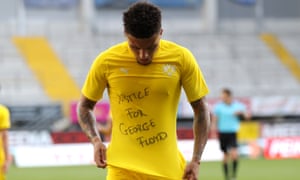[ad_1]
Talk is famously cheap and out of the mouths of international football administrators tumble platitudes that are not worth the paper they will soon be written on. While encouraging, the apparent freedom granted by Fifa to players who wish to throw their collective shoulder to the wheel of protest against the sickening death of George Floyd at the knee of a Minnesota policeman should perhaps be greeted with scepticism.
“For the avoidance of doubt, in a Fifa competition the recent demonstration of players in Bundesliga matches would deserve an applause and not a punishment,” said Gianni Infantino after on-field gestures made by the brave Bundesliga players Jadon Sancho, Achraf Hakimi, Weston McKennie and Marcus Thuram.
The avoidance of doubt, eh? On Sunday night Fifa appeared to have made an uncharacteristically controversial statement of its own, apparently endorsing the sentiment scrawled in marker on the “Justice For George Floyd” T-shirt revealed by Sancho after he had scored the first of his three goals for Borussia Dortmund against Paderborn.
A graphic celebrating the young Englishman’s stats was posted on its Twitter account, with the accompanying photo of Sancho in his moment of defiant solidarity prompting raised eyebrows among football fans unused to such political grandstanding from world football’s governing body.
There were good grounds for reservations. In approximately the time it takes to admonish a communications department minion tasked with updating a major football federation’s social media account on a quiet Sunday evening, the tweet was deleted and replaced with one bearing an illustration in which mentions of Floyd or calls for justice on his behalf were conspicuous by their absence. As you were, nothing to see here.
It would be a couple of days before Infantino spun the official Fifa line that player protest in the face of Floyd’s death and the civil unrest that followed was to be commended, comments in keeping with the manner in which he has consistently stressed the need to tackle racism in football since becoming president of Fifa.
Infantino has always talked a good game, even if his proclamations are somewhat at odds with the plumes of smoke he blew up the nether regions of Donald Trump at the World Economic Forum in Davos in January. “He says actually what many think, but more importantly, he does, then, what he says,” he said without so much as a hint of sarcasm.
When it comes to tackling racism Infantino and the organisation over which he presides have repeatedly come up short. Following the 2018 Under-20 World Cup, the Football Association was fined £16,000 after an England player committed the heinous crime of sipping from a can of energy drink that was Fifa unapproved. The sanction was only £4,000 less than that imposed on the Russian Football Union when its serially offending fans repeatedly subjected black French players to racist abuse in a friendly played in March of the same year.

“This incident is just another example of why there is little confidence in Fifa to respond robustly to incidents of discrimination at the World Cup this summer,” said Lord Herman Ouseley, the then chairman of Kick It Out. While Fifa did not hand down any punishments for racist behaviour inside stadiums during Russia 2018, Infantino’s pre-tournament threats of “serious consequences” were conveniently vague and we learned how robustly Fifa planned to respond to incidents of discrimination when Mexico were fined less than £10,000 after their fans were heard chanting homophobic slurs.
Uefa has never been renowned for the seriousness of any consequences for fans caught misbehaving on its manor, the leniency of any punishments imposed on countries whose supporters commit racially aggravated crimes long having been the subject of international derision.
The £80,000 fine in 2012 with which the Denmark striker Nicklas Bendtner was hit in for incorporating a pair of bookie-sponsored “banter” pants into a goal celebration remains the yardstick by which all comparatively light punishments handed down by Uefa for more serious racially motivated offences are judged.
Last October European football’s governing body was urged to overhaul its policy on racism following the decision to fine Bulgaria £65,000 and order them to play one game behind closed doors after their fans subjected black England players to relentless racist abuse in Sofia. Even the fact it was one of the more severe punishments it has handed down will have done little to disabuse those predisposed to behaving like knuckleheads of the notion that if you make monkey noises you get fined peanuts.
“Football is a sport which encourages tolerance, inclusion and justice,” happy-clapped Uefa’s president, Aleksander Ceferin, this week while offering his appraisal of the various ways in which young black players made a stand in Germany. “These are the same values being espoused by those showing solidarity to George Floyd.”
As the head of an organisation whose efforts to stamp out hate crimes extend little further than gently tapping the wrists of those whose abhorrent views remain resolutely unaltered in the face of tokentistic pre-match photo-ops in front of anti-racism banners, one can’t help but wonder just how brave Aleksander would be in the face of a baton charge of Trumpian robocops armed to the teeth and hell-bent on wreaking havoc.
Evidence suggests that, like Howard Beale in the film Network, a new generation of young black players are as mad as hell and they’re not going to take this any more. It will be intriguing to see whether football’s governing bodies give them their full support, or whether their big talk from this week turns out to be little more than that: just talk.
[ad_2]
Source link